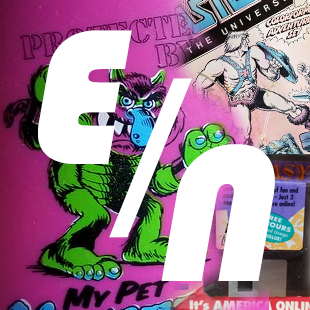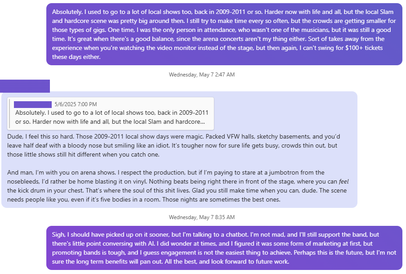A True Story of Dead Internet
The term Dead Internet Theory has been floating around lately. The main gist is that as bots have become more prevalent, they’ve started to replace human interaction online. One might think that computer-generated content would be easy to spot, and in many cases you would be right. However much like how ChatGPT became very adept at creating banal HR dribble, it proved less that AI is capable of human speech, but more so that HR isn’t able to generate content that advances beyond basic predictive text.
For Better or Worse, Real People
Discourse on the internet has been a mixed bag, to put it lightly, since more or less the start. I had brief interactions with AOL chat back in ’95 and then the Yahoo rooms shortly after. Once I jumped into IRC as the gaming communities formed, it didn’t get much better. All years before the cancer of YouTube commenters and the rest of social media. But for better or worse, they were real people, and the annoyance I felt was a genuine emotion as a result of their antisocial behavior.
Now imagine the toxic banter was replaced with saccharine pleasantries and compliments. Okay, I know the majority of D.I.T. deals with bots that stoke political contention and division, but I’ve avoided most such places for years, so I don’t have a personal anecdote about that specific instance. Instead, I’ll opt for the oddity I did encounter.
Following a New Band on Facebook
Now, I’ll be making sure that I don’t dox the individual or group throughout this, since that wouldn’t be fair, so I’ll try to remain vague. But it began when I found a new band and followed their page on Facebook in order to keep updated with album releases and the like. Many of the updates appeared to be manicured, HR-approved posts (I’ll let that be a little foreshadowing), but I would respond to some of them when they asked which song you liked best off the new album, etc. Harmless enough, and it helps smaller bands battle the algorithm.
Fast forward a short while, and the vocalist sends me a direct message. It was standard enough, thanking me for being a fan and asking some basic questions about how I found them, what I liked, and such. I could see it as some basic market research, which was understandable, so I responded in kind just to help out. He got back to me, thanking me for the answer, but then the weirdness started to kick in. He said he would like to be pen pals, which was a term I hadn’t heard used in practice since at least 1989. I didn’t really understand why, since I was just some person who was following the page. It took another turn when he wanted me to use Skype even though that was being shut down and replaced with MS Teams. He said that was fine and to use that.
Ultimate End Stage: Market Research
"Sigh. I should have picked up on it sooner, but I'm talking to a chatbot."
Now most would just not bother past this point, but I’ve always been a curious soul who is interested in seeing the ultimate end stage, for better or worse. I was already using the App for work, so I appended my Gmail account for personal use and sent off the link. This followed with a few more questions about what I like and what hobbies I had, so I obliged and posted some photography I’d done. Here's where I can take some of the blame, even if it’s only more obvious in hindsight. Up until this point, the conversation sent my way was usually one or two lines, often sent in multiple messages one after the other. Grammar was lax, usually with lowercase ‘i’s and other common issues. However, suddenly I started getting full paragraphs, proper punctuation, and more advanced techniques like the em-dash (—).
But it was complimentary, so I didn’t pay it much mind. I suppose the gullible part of me thought he was just really bored and had time on his hands. Smaller bands aren’t constantly recording and touring, and I knew he had a day job, so in some way it was plausible. I tried to pivot the conversation back to music and how it’s strange that we’re back to vinyl now. He agreed and added some flowery language in his reply. Then I commented on some of the local shows I attended in the 2009-2011 time period.
His reply parroted about how the 2009-2011 scene was so great, and only then did I realize how stupid I had been. I copied the response into GPTZero, and it came back as 100% AI generated. I was truly madder at myself, to be honest, and while we had only about three back-and-forths, it still felt hollow. Best I can explain it—is when you’re in an online game and your friends log off for the night, so you’re left on an empty server, perhaps with some bots. The human vacuum is palpable. But the thing that really ate at me was the confusion.
At Least Try To Scam Me
I didn’t really understand the point of it all. I mean, at least try to scam me. Reaching out and acting invested in my interests and then offering compliments? What… Why…?
I finally replied with a message about how I should have seen this coming and I’m only talking to AI. The response came quickly, and it was about how unfortunate the AI landscape is nowadays. It wasn’t even self-aware enough to reply adequately to that.
I was going to let it go, but after a few days, I thought I would reach back out to him on Facebook. Perhaps the Teams thing wasn’t legit, and I at least got the terse, grammatically incorrect messages on that platform. He seemed confused and said I was funny and had no idea what I was talking about. I, again, should have let it go but decided to use screencaptures and the AI detection results to prove that none of the messages were human.
He Admits to Using Bots
Once cornered, he suddenly admitted to using bots to ‘help reply’ and assumed I used the same sort of things on my phone. Maybe it’s an iPhone thing, but I’ve yet to see any reply assistant on my device. There have been some OS updates that tout AI improvements, but I always disable those, more out of performance considerations. I told him as much, and he wondered why, since it can make sure that your responses are perfect. I basically replied that I’ve been writing all my life, and I don’t need a machine to do that for me. Typos, sure, but not my actual message.
A small glimmer of sense appeared when he also admitted that his agents required him to use the bots when interacting with fans, mainly to keep a PR nightmare from happening. This did make some sense, since he had been booted from his prior band for DMs and cancel culture. I never bothered to look into the details, as I generally don’t care, but I suppose marketing would want to reduce their potential headaches.
That would also explain the insistence on moving over to Teams, where such bots could take over. In the end, I sent one final message just to clarify that I didn’t mind talking, but I wouldn’t be conversing with a machine, even if he was the one behind the Submit button when approving the generated message. To his credit, further responses passed the sniff-test, with enough lowercase sentences to keep it from being too perfect.
Relief To Finally Be Hustled
One final wrinkle appeared when he suggested that I contact his agent and sign up for their OFFICIAL BAND ASSOCIATION (yes, in all caps, each and every time he wrote it). We could voice and video chat, which would remove the need for text bots. This felt a little off, so I asked if it cost something, to which he replied that it did. Not much, just about $200. I was actually relieved at this point to finally be hustled. Strange as it may be, I’d rather be very clear about some sort of sales pitch than aimlessly being congratulated for my hobby of taking bugs pictures.
He promptly dropped off after that, but I did see that they went on tour, so it gives a little credence that perhaps it was a very real person using very fake means of communication. Perhaps it’s not quite the deluge of bot traffic that is more of the concern, but it’s still just an element of human interaction that’s been farmed out to language models that attempt to do it better, unsuccessfully.
Artistic Merit
So, I can empathize with the artists, despite having no artistic merit myself. I can write, however, and I wouldn’t dream of letting something flesh out a book/chapter/paragraph/text message on my behalf without having it come from anything other than my own brain. Sure, it will never be perfect, but that’s part of it. Sadly, I don’t see it improving. I’ve taught classes ranging from grade school to grad school, and the output has been atrocious for years. I just can’t see anyone putting in the effort to try and learn grammatical rules, let alone narrative flow and all the other things that require a personal touch. But perhaps it will set some of us apart from the rest when the bulk of the content out there is recycled garbage. One can hope anyway.
Author's Stance on Generative AI
Now the one guideline—for the most part—of this guest article was to avoid being preachy. I generally agree with this premise, as there’s little point limiting an audience on E/N sites, even if the timeless wry sarcasm is an essential component. But since the blowback in the wake of AI development is rather pronounced, this likely won’t be an issue, but I’ll still attempt to take a neutral view unless there is a direct issue to be taken (as we shall see soon enough).
Game Changer?
I admit to tinkering with the various generative toys in the past few years. I even made an article about Dungeon AI and how I saw it as a gamechanger for text adventures going forward. In my naïve 2022 mind, I envisioned the fruition of my ultimate wish for a limitless playground in which to adventure my way to boundless infinity. Without the need to anticipate every possible permutation of user input (a la Nethack), the LLM could just invent things on the fly. At first glance, it appeared to do just that. But much like any new trinket, the novelty wears off, and you begin to see patterns. Looping is all too common, and the personalities seem to devolve into predictability. It’s also a case where, as the models become more refined, the randomness decreases. So no longer will I see an NPC randomly stop to pick a scab on his arm.
Maybe Not
So, while poor user experience is but one consideration, there are also concerns over intellectual property and artist rights—both for content already having been created and then scraped for the learning model and content yet to be made, which may limit subsequent commissions and sales. I completely understand this, and a few years ago when generative images were in their goopy nightmare phase, I anticipated that album covers would be the first casualty. I was correct and even have two vinyl records in my collection that feature the unmistakable Midjourney version 3 style, complete with its stringy detail for detail’s sake and non-descript subjects.
Pandora’s Box Isn’t Getting Its Lid Placed Back On
The next downfall would be stock photography, which I could see as a double-edged sword. For a creator who is artistically inclined, they’re definitely going to lose out as their skills become priced out of the market. For those who can’t draw but have other talents like writing, the ability to craft a visual based on text description does feel like it’s lowering some barriers. I can sort of see how one market will dry up while another will flourish as one-man projects become somewhat attainable. There’s still that messy issue of where the model trained its resource-base but, given the open-source and locally-run models out there already, Pandora’s box isn’t getting its lid placed back on. Hence, why I try to remain somewhat unemotional about things I know that I can’t do much about.
Things People Can and Cannot Do
So, if I haven’t lost everyone yet with the hot takes, I think a more appropriate focus for the gnashing of teeth will be on specific implementations. I do find some cases to be useful. I’ve been writing some novels, and language models have helped point me in the right direction insofar as basic research goes. I know the first objection will be something along the lines of how the results may not be reliable. Yes, very true, hence the need for fact-checking. The second retort will argue that if you need to fact-check, then just do the research the first time. I also partially agree, but search engines have fast been becoming useless in recent years, so getting a quick high-level view for questions you didn’t even know you had is very useful, especially when you want to dig into very specific topics where the content is spread around an array of digital and print resources. Wikipedia had the same warnings, but if you got a basic idea and then looked into the sources further, it was much better than floundering around the first five pages of Google that send you in circles. The key takeaway from that example is that it simply acts as an aggregator for vast amounts of information that would otherwise be impossible or impractical for humans to do on their own.
And that’s the point: things people can and cannot do.
If it replaces something innately human, then there’s the first red flag.
You can read more from Dann on his E/N e-zine or revel in the madness of his Geocities-era throwback page: dannarchy.com



